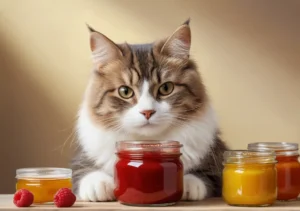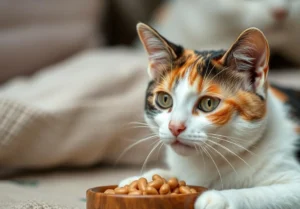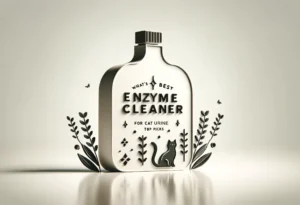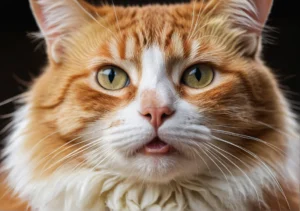Cats are notorious for their love of milk, but can they actually have cows milk? Let’s find out why this classic combination may not be as harmless as it seems.
Cats lack the necessary enzymes to properly digest lactose, the sugar found in milk, which can lead to digestive issues such as diarrhea and vomiting. Because of this, it’s best to avoid giving your feline friend cows milk to keep them happy and healthy.
What is Lactose Intolerance in Cats?
Let’s get straight to the point: cats are lactose intolerant. This means that their bodies have a tough time digesting lactose, the sugar found in milk. When cats consume milk, the lactose can cause digestive issues like bloating, gas, and diarrhea. Kitties lack the necessary enzymes to break down lactose effectively, leading to these unpleasant symptoms.
Now, you might be thinking, “But my cat loves milk!” It’s a common misconception that cats and milk go hand in hand. While it may seem like a treat, it’s best to avoid giving milk to your feline friend to prevent any digestive discomfort. Opt for cat-friendly alternatives like water or specific cat milk designed to be lactose-free.
How Does Cows Milk Affect Cats?
When it comes to cows milk and cats, the lactose content can wreak havoc on your feline’s digestive system. Consuming milk can lead to upset stomach, vomiting, and diarrhea in cats due to their lactose intolerance. This is why it’s crucial to steer clear of offering cows milk to your furry companion.
Furthermore, cows milk doesn’t provide any essential nutrients that cats need in their diet. In fact, giving milk to your cat can even lead to obesity and nutritional deficiencies if it replaces their balanced cat food. It’s important to prioritize a balanced and nutrient-rich diet specifically tailored for cats to ensure their overall health and well-being.
So, the next time you’re tempted to offer your cat a saucer of milk, remember the potential consequences of lactose intolerance and opt for a more cat-friendly choice to keep your feline friend happy and healthy.
What are the Signs of Lactose Intolerance in Cats?
Lactose intolerance in cats can lead to various symptoms that indicate their inability to digest milk properly. Common signs include diarrhea, vomiting, abdominal discomfort, flatulence, and rumbling sounds in the stomach. If your cat displays any of these symptoms after consuming milk, they may be lactose intolerant. It’s essential to consult your veterinarian for further advice and guidance on your cat’s diet.
Are Some Cats Able to Tolerate Lactose?
While most adult cats are lactose intolerant, there are rare cases of some cats being able to tolerate lactose to some extent due to a mutation that allows them to produce lactase, the enzyme necessary for digesting lactose. However, even if your cat can tolerate lactose, it’s still essential to limit their intake of cow’s milk as it can lead to obesity, digestive issues, and nutritional imbalances. Always opt for specially formulated cat milk or consult your vet for suitable alternatives to ensure your feline friend’s health and well-being.
What are Safe Alternatives to Cows Milk for Cats?
If you’ve ever wondered why cats can’t have cows milk, here’s the scoop: most cats are lactose intolerant, meaning they lack the enzyme needed to properly digest lactose. This can lead to upset stomachs, diarrhea, and general discomfort for your feline friend. So, what are some safe alternatives to cows milk for cats?
Cat Milk : Yes, there is specially formulated cat milk available at pet stores that are lactose-free and easier on your kitty’s tummy. This is a great alternative if your cat enjoys the taste of milk but can’t handle the real deal.
Wet Food : Mixing a bit of water into your cat’s wet food can help increase their hydration without the risk of upset stomach from milk. Plus, it’s a nutritious option that your cat will likely enjoy.
Water : The best and most natural option for hydration is good old water. Make sure your cat has access to fresh, clean water at all times to keep them healthy and happy.
Keep your cat cozy and comfy by avoiding cows milk and opting for these safe alternatives instead. Your furry friend will thank you!
Can Kittens Have Cows Milk?
When it comes to kittens and cows milk, it’s a bit of a gray area. While kittens can tolerate their mother’s milk, cows milk can pose a risk due to its lactose content. Kittens, just like adult cats, can be lactose intolerant, leading to digestive issues if given cows milk.
However, there are some exceptions to the rule. Some kittens may be able to handle small amounts of lactose-free milk, such as specially formulated kitten milk replacers. These products are designed to mimic a mother cat’s milk and are generally safe for kittens to consume.
Ultimately, it’s best to consult with your veterinarian before offering any type of milk to your kitten. They can provide personalized advice based on your kitten’s specific health needs and dietary requirements. Keep your curious little ball of fur healthy and happy with the right milk choices!
How Can I Safely Treat My Cat to a Milk Snack?
Contrary to popular belief, cats cannot tolerate cow’s milk due to lactose intolerance. Lactose, the sugar found in milk, can cause digestive issues such as diarrhea and upset stomachs in cats. However, there are alternative treat options that you can safely offer your feline friend to satisfy their milk cravings. Consider giving your cat lactose-free milk or milk specifically formulated for cats. Cat treats that have a milky flavor can also be a great substitute. Remember, cats have unique nutritional needs, so always check with your veterinarian before introducing any new treats into their diet.
Milk Alternative Treat Options:
- Lactose-free milk
- Milk specifically formulated for cats
- Cat treats with a milky flavor to satisfy their cravings
What Should I Do If My Cat Ingests Cow’s Milk?
If your cat accidentally consumes cow’s milk and starts experiencing adverse reactions, there are steps you can take to help alleviate their discomfort. Firstly, monitor your cat for symptoms such as diarrhea, vomiting, and abdominal pain. Make sure your cat has access to fresh water to stay hydrated. If symptoms persist or worsen, contact your veterinarian immediately for further guidance and possible treatment. Remember, prevention is key, so always keep cow’s milk away from your feline friend to avoid any unwanted health issues.
Fun Fact about Cats and Dairy
Did you know that not all cats are lactose intolerant? While many adult cats do have trouble digesting lactose in dairy products like milk, some kittens and cats actually do just fine with it. However, it’s still best to avoid giving your feline friend cow’s milk to prevent any potential digestive issues.
Here’s a unique insight: even though cats may enjoy the taste of milk, it’s not a necessary part of their diet. Cats are obligate carnivores, meaning they get all the essential nutrients they need from a balanced diet of meat-based foods. So, while cats may love the occasional lick of milk, it’s not a dietary requirement for their health and well-being.
Alex, a passionate animal lover, has experience in training and understanding animal behavior. As a proud pet parent to two dogs and three cats, he founded AnimalReport.net to share insights from animal experts and expand his knowledge of the animal kingdom.




